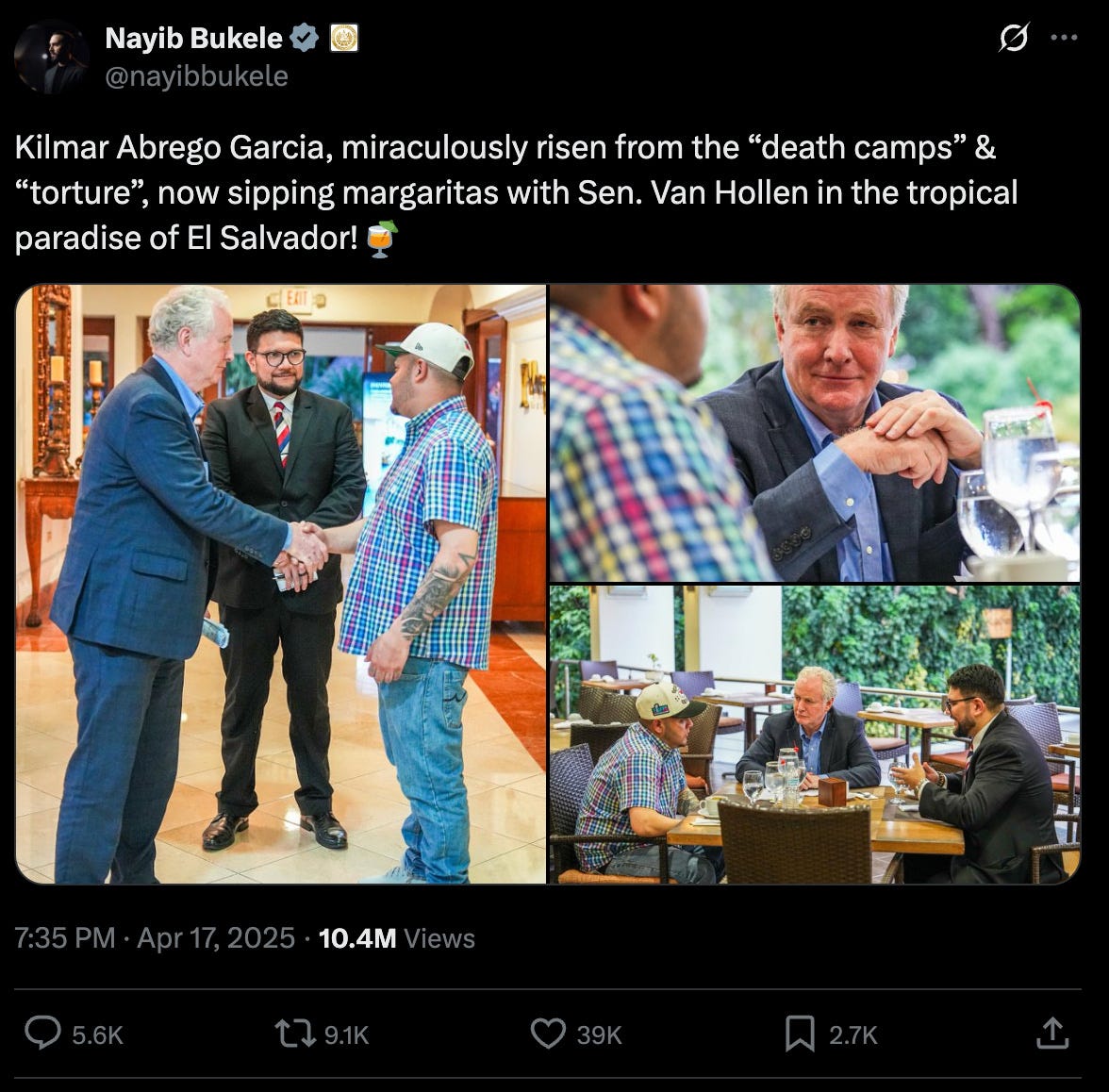When Maryland resident Kilmar Abrego Garcia was sent to El Salvador in March 2025, it happened in direct defiance of a U.S. court order. That alone should’ve triggered a constitutional crisis. But under the current Trump administration, this wasn’t seen as a scandal—it was part of the plan.
Behind the staged photo-ops and tropical optics lies a far darker reality: a secret financial deal, mass human rights violations, and an administration willing to export its dirty work across borders.
This is the real story behind the margaritas, the mega-prisons, and the people they tried to disappear.
The Forced Removal That Defied the Constitution
Kilmar Abrego Garcia wasn’t just another immigration case. He was legally living in Maryland under withholding of removal—a protected status that explicitly barred his removal because returning him could put his life in danger.
But in March 2025, he was forcibly transferred to El Salvador anyway, in what the Trump administration later called a “clerical error.” That “error” landed him inside El Salvador’s notorious mega-prison, CECOT—a facility known more for state-sponsored terror than justice.
A federal judge ordered that the government facilitate his return. The Supreme Court agreed.
Justice Sonia Sotomayor, joined by Justices Kagan and Jackson, issued a pointed rebuke of the administration’s legal defense. She warned that if the government could forcibly remove a person in defiance of a court order and then claim helplessness once the transfer was complete, it would set a terrifying precedent:
“It would permit the Executive Branch to deport and incarcerate any person, including U.S. citizens, without legal consequence, so long as it does so before a court can intervene.”
In other words, if the government moves fast enough, the courts become irrelevant.
But rather than comply with the Court’s clear intent, the Trump administration seized on a single word in the ruling—“facilitate.” They intentionally interpreted it narrowly, arguing they were not required to bring Abrego Garcia back, only to allow his return if El Salvador chose to release him.
No diplomatic retrieval. No chartered flight. No accountability.
Just legal semantics layered over a man disappeared.
The Supreme Court had spoken. But the administration chose to hear only what it wanted and willingly defied both rulings, claiming they lacked the authority to retrieve someone held by a foreign government—conveniently omitting the fact that they were the ones who sent him there in the first place.
And they didn’t do it for free.
The $15 Million Deal to Imprison U.S.-Removed Detainees
After visiting Abrego Garcia in El Salvador, Senator Chris Van Hollen revealed the existence of a secretive financial agreement: a $15 million deal struck between the Trump administration and Salvadoran President Nayib Bukele.
The terms were simple. The U.S. would pay El Salvador to detain individuals it had removed from the country—people like Kilmar Abrego Garcia. According to Van Hollen, $4 million had already changed hands by mid-April.
A State Department memo corroborated the arrangement, originally framed as a plan to hold 300 “high-risk individuals.”
But a 60 Minutes investigation told a different story: the vast majority of those sent were not criminals at all. Many had no prior charges or convictions. Some were asylum seekers, students, or migrants flagged by agents for things as arbitrary as tattoos or association with protest groups.
No trials were conducted. No evidence presented. No due process observed.
This was not immigration enforcement. This was not “deportation.” It was a quiet export of detention—a way to imprison people beyond the reach of American courts.
Margaritagate: Staging Smiles in a Cage
When Senator Chris Van Hollen sat down with Kilmar Abrego Garcia in a hotel restaurant in El Salvador, the scene was meant to be quiet, private, and serious. But what unfolded was pure political theater.
Initially, the two men had only water and coffee between them. Then, midway through their meeting, Salvadoran officials quietly approached and placed two drinks on the table—garnished with maraschino cherries, rimmed with salt, and unmistakably designed to look like margaritas.
The intent was obvious: stage a photo. Create a narrative. And within hours, the images appeared on social media, posted by President Nayib Bukele himself.
“Kilmar Abrego Garcia, miraculously risen from the ‘death camps’ & ‘torture,’ now sipping margaritas with Sen. Van Hollen in the tropical paradise of El Salvador!” Bukele wrote, complete with a tropical drink emoji.
But this wasn’t just a petty political stunt—it was state propaganda.
Van Hollen quickly dismantled the illusion, pointing out that neither man had touched the drinks. The salt rims were fully intact. Abrego’s glass was intentionally filled slightly lower, to suggest he had been drinking from it.
“They wanted to create this appearance that life was just lovely for Kilmar,” Van Hollen said. “Which of course is a big, fat lie.”
This wasn’t about optics—it was about rewriting the story.
Bukele, facing increasing international criticism for operating a mega-prison built on secret detentions, needed a way to undermine the growing outcry. By staging a smiling reunion over faux cocktails, he sought to reduce credible claims of human rights abuses to a punchline.
A Page Out of the Authoritarian Playbook
This kind of state-sponsored illusion isn’t new. History is littered with regimes dressing up cruelty in the language of comfort.
North Korea famously stages guided tours of its “Demilitarized Zone,” showcasing clean villages with well-fed workers and laughing schoolchildren—all while most of the country suffers in poverty and repression. Behind the curtain, it’s a different reality entirely: famine, prison camps, and silence under threat of execution.
In Nazi Germany, the Theresienstadt “ghetto” camp was briefly transformed into a propaganda set to fool Red Cross inspectors. Prisoners were cleaned up, given musical instruments, and instructed to act as if they lived in a peaceful community. Days later, many were sent to extermination camps.

Even in the United States, during the internment of Japanese Americans in World War II, government-produced newsreels showed families playing baseball and attending school, hiding the truth of life behind barbed wire and under armed guard.
What Bukele did was part of a well-worn strategy: dress up repression. Manufacture a smile. Control the image—and you control the narrative.
But in this case, the mask slipped. And what we saw wasn’t a tropical paradise. It was a silent hostage, flanked by salt-rimmed spin.
The 238 Vanished
Abrego Garcia is just one face in a wider pattern. In March 2025, the Trump administration forcibly transferred 238 Venezuelan nationals to El Salvador using the Alien Enemies Act—a Civil War–era law originally used to detain enemy nationals during World War II.
These removals, framed as targeting violent gang members and terrorists, were conducted with alarming speed. But a 60 Minutes investigation found that most had no criminal records. Some, like Andry Hernandez Romero—a gay makeup artist and asylum seeker—were flagged simply for tattoos that agents deemed suspicious.
Once in El Salvador, they were stripped, shackled, shaved, and locked into CECOT. Legal access was denied. Records vanished. Family members were left in the dark.
International observers now call it what it is: a mass disappearance campaign, outsourced to a foreign strongman with American funding.
Bukele: America’s Willing Strongman
President Nayib Bukele has built his reputation on authoritarian glamour and violent efficiency.
Since 2022, Bukele has jailed more than 72,000 people under emergency powers that suspend civil liberties. He’s stacked El Salvador’s courts, erased term limits, and embraced militarization—all while maintaining sky-high approval ratings.
For an administration desperate to sidestep constitutional limits, Bukele was the perfect partner: authoritarian, cooperative, and photogenic.
And thanks to U.S. dollars, his mega-prison now houses not just Salvadorans—but anyone the Trump administration wanted removed from sight.
This Was Never About Safety. It Was About Power.
Senator Van Hollen said it plainly:
“I support the rule of law. That's exactly my point here. And if you threaten the rule of law for one person, you threaten it for everybody in America.”
Because if the U.S. government can extract someone from their home, ship them across international borders in secret, ignore court rulings, and fund a regime to keep them locked away—what stops them from doing it to someone else?
There was no due process. No transparency. No accountability.
Just silence, salt-rimmed glasses, and a disappearing act bought and paid for.
This article is part of an ongoing investigation into the use of the Alien Enemies Act and the secretive deportation of innocent Venezuelan nationals to an El Salvadorian Prison.
If you made it this far — thank you. This blog is completely free and always will be. I write to make sense of the chaos, connect the dots, and say the quiet part out loud when no one else will.









I can't say it enough: Trump is a POS!